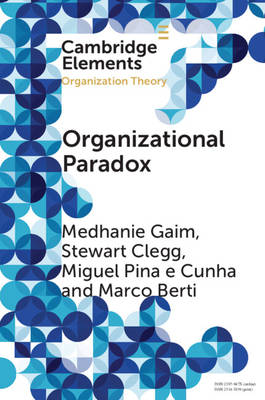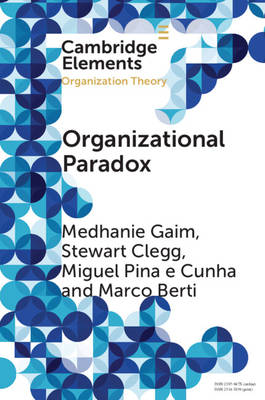
Je cadeautjes zeker op tijd in huis hebben voor de feestdagen? Kom langs in onze winkels en vind het perfecte geschenk!
- Afhalen na 1 uur in een winkel met voorraad
- Gratis thuislevering in België vanaf € 30
- Ruim aanbod met 7 miljoen producten
Je cadeautjes zeker op tijd in huis hebben voor de feestdagen? Kom langs in onze winkels en vind het perfecte geschenk!
- Afhalen na 1 uur in een winkel met voorraad
- Gratis thuislevering in België vanaf € 30
- Ruim aanbod met 7 miljoen producten
Zoeken
Omschrijving
Paradoxes, contrary propositions that are not contestable separately but that are inconsistent when conjoined, constitute a pervasive feature of contemporary organizational life. When contradictory elements are constituted as equally important in day-to-day work, organizational actors frequently experience acute tensions in engaging with these contradictions. This Element discusses the presence of paradoxes in the life of organizations, introduces the reader to the notion of paradox in theory and practice, and distinguishes paradox and adjacent conceptualizations such as trade-off, dilemma, dialectics, ambiguity, etc. This Element also covers what triggers paradoxes and how they come into being whereby the Element distinguishes latent and salient paradoxes and how salient paradoxes are managed. This Element discusses key methodological challenges and possibilities of studying, teaching, and applying paradoxes and concludes by considering some future research questions left unexplored in the field.
Specificaties
Betrokkenen
- Auteur(s):
- Uitgeverij:
Inhoud
- Aantal bladzijden:
- 80
- Taal:
- Engels
- Reeks:
Eigenschappen
- Productcode (EAN):
- 9781009124348
- Verschijningsdatum:
- 22/09/2022
- Uitvoering:
- Paperback
- Formaat:
- Trade paperback (VS)
- Afmetingen:
- 152 mm x 229 mm
- Gewicht:
- 117 g

Alleen bij Standaard Boekhandel
+ 66 punten op je klantenkaart van Standaard Boekhandel
Beoordelingen
We publiceren alleen reviews die voldoen aan de voorwaarden voor reviews. Bekijk onze voorwaarden voor reviews.









